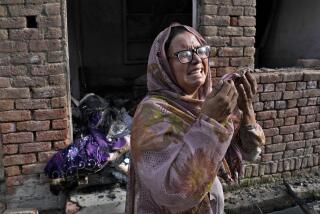Pakistani cleric is seized trying to flee compound
- Share via
ISLAMABAD, PAKISTAN — After months of whipping his followers into a frenzy of antigovernment sentiment, the head cleric at a radical mosque was caught Wednesday trying to slip out of his besieged compound clad in a head-to-toe veil known as a burka, police said.
The arrest of Maulana Abdul Aziz came as police and paramilitary troops backed by armored vehicles and helicopters surrounded the mosque, which was the scene of a shootout Tuesday that left as many as 16 people dead. More than 1,100 of Aziz’s followers surrendered to authorities Wednesday.
At nightfall, hundreds of students remained barricaded inside the Lal Masjid, or Red Mosque, some of them vowing to seek “martyrdom.” Aziz had threatened suicide attacks by his followers.
Many of those who did leave the compound were female seminary students, and Pakistani authorities brought in female officers to search them. When the officers lifted one long black veil, they found Aziz.
The cleric, along with his brother, Abdul Rashid Ghazi, has long been a wanted man. But the pair rarely left the compound, and the government of President Pervez Musharraf apparently had not entered the site to arrest them earlier for fear of inflaming Islamic militants. It was not immediately known whether Ghazi had escaped, or remained inside the mosque compound.
Disciples of the brothers had challenged the government’s authority over the last six months with a series of increasingly provocative actions, including kidnapping police officers and seeking to impose a Taliban-style code of behavior in the tranquil and relatively liberal Pakistani capital.
The vigilante campaign by Aziz’s followers began in February with female students’ seizure of a public library adjacent to one of the compound’s two madrasas, or Islamic seminaries. They initially demanded that the government drop plans to raze illegally built mosques in the capital, but later expanded their demands, saying they sought the imposition of Sharia, or Islamic law.
The mosque compound has for months been an incongruous presence in a leafy, affluent residential neighborhood, less than a mile from the capital’s diplomatic enclave and the president’s office.
Masked men brandishing clubs and sometimes rifles stood guard atop its walls. Female students wore burkas, the all-encompassing black veils that are relatively unusual in the capital.
After the violence erupted, police sealed off the area, but also offered amnesty to any women and children inside, along with any men who had not taken part in armed attacks.
Most of the students at the two seminaries were from elsewhere in Pakistan, primarily drawn from religiously conservative areas such as North-West Frontier Province, which borders Afghanistan.
Musharraf said previously that he had not ordered the compound stormed and emptied because he did not want to set off large-scale bloodshed. But he was criticized in some circles for appeasing the militants, an echo of allegations that his government has turned a blind eye to a buildup of Taliban and Al Qaeda fighters in Pakistan’s tribal lands along the border with Afghanistan.
Other critics, however, pointed out that the dramatic standoff has diverted public attention from a political crisis over Musharraf’s efforts to sideline Pakistan’s chief justice, who has presented himself as a potential impediment to the president’s plans to have himself reelected by a rubber-stamp parliament this year before permitting general elections to take place.
The government crackdown at the mosque prompted protests in Pakistani cities, including Lahore and Quetta, organized by hard-line religious parties. But the standoff has not generated large-scale opposition from Islamic militants, in part because Aziz and his brother alienated many other important Muslim clerics.
Wednesday brought scattered violence along Pakistan’s border with Afghanistan, but it was not clear whether the incidents were related to the mosque confrontation.
At least five Pakistani troops and five civilians, including a district official, were killed when a suicide bomber attacked a Pakistani army convoy, authorities said.
Outside the frontier city of Peshawar, a police station came under attack, apparently by militants. One officer was killed.
--
Special correspondent Zaidi reported from Islamabad and Times staff writer King from Kabul, Afghanistan.
More to Read
Sign up for Essential California
The most important California stories and recommendations in your inbox every morning.
You may occasionally receive promotional content from the Los Angeles Times.













